Are you a proud golden retriever owner or considering adopting one of these lovable pups? If so, you may be wondering if golden retrievers have a natural inclination to dig. While digging is an innate behavior for many dogs, some breeds are more prone to it than others. So, do golden retrievers have a penchant for excavating your yard?
In this blog post, we’ll delve into the question of whether or not golden retrievers dig. We’ll explore the reasons why dogs dig and what factors could influence a golden retriever’s digging behavior. Plus, we’ll share tips on how to prevent unwanted digging and highlight both the potential benefits and drawbacks of this behavior.
As you read on, you might be surprised to discover some of the reasons why golden retrievers love to dig. From creating cool spots in the summer heat to burying their favorite toys, these pups have a knack for getting their paws dirty. Whether you’re trying to curb excessive digging in your yard or simply curious about your furry friend’s behavior, this post will provide valuable insights.
So, grab a steaming cup of coffee and settle in because we’re about to unearth the fascinating world of golden retrievers and their affinity for digging.
The Instinctive Nature of Digging in Golden Retrievers
Contents
- 1 The Instinctive Nature of Digging in Golden Retrievers
- 2 Reasons Why Golden Retrievers May Dig
- 3 Addressing Unwanted Digging Behavior in Golden Retrievers
- 4 Providing Activities and Toys to Keep Your Golden Retriever Entertained
- 5 Creating a Safe and Secure Environment for Your Dog
- 6 Training Techniques to Discourage Unwanted Digging
- 7 Conclusion
Golden Retrievers are beloved for their friendly and loyal nature, but they also have natural instincts that can sometimes lead to unwanted behavior. One such behavior is digging, which is a common question that Golden Retriever owners ask about. The answer is yes – they do have a tendency to dig. But why do they do it, and how can this behavior be managed?
Digging is rooted in Golden Retrievers’ natural instinct as hunting dogs. In the wild, their ancestors would dig holes to bury food and create shelter. While domesticated Golden Retrievers don’t need to hunt for their food or shelter, the instinct to dig still remains. This behavior can manifest in various ways, and the intensity and frequency of digging may vary between individual dogs.
One reason for this behavior is that Golden Retrievers were originally bred as hunting dogs – digging was part of their job description. They would dig up prey or retrieve game that had been buried by their owners. This instinct is deeply ingrained in their DNA, making it challenging to discourage them from digging entirely.
Another reason why Golden Retrievers dig is for pleasure and satisfaction. Digging can be a form of mental and physical stimulation for them, similar to how humans engage in hobbies or activities they enjoy. It can also be a way for them to cool off during hot weather or create a comfortable spot to rest.
However, excessive digging can become destructive if it’s not properly managed or if the dog becomes obsessed with it. It can damage gardens, lawns, or even pose a risk to the dog’s safety if they dig holes that are too deep.
So how can this behavior be managed? First and foremost, provide plenty of mental and physical stimulation for your Golden Retriever. Regular walks, playtime, and puzzle toys that challenge their minds can help keep them occupied and stimulated. If your dog is left alone for extended periods, make sure they have toys or activities to keep them entertained.
If your Golden Retriever consistently digs up your yard or damages your property, it’s important to address the behavior before it becomes a habit. One effective solution is to provide a designated digging area, such as a sandbox or specific part of the yard. Encourage your dog to dig in this area by burying treats or toys, and reward them for using it.
If the digging behavior continues despite these solutions, seek professional help from a trainer or behaviorist. They can assess the situation and provide tailored guidance for managing this natural instinct.
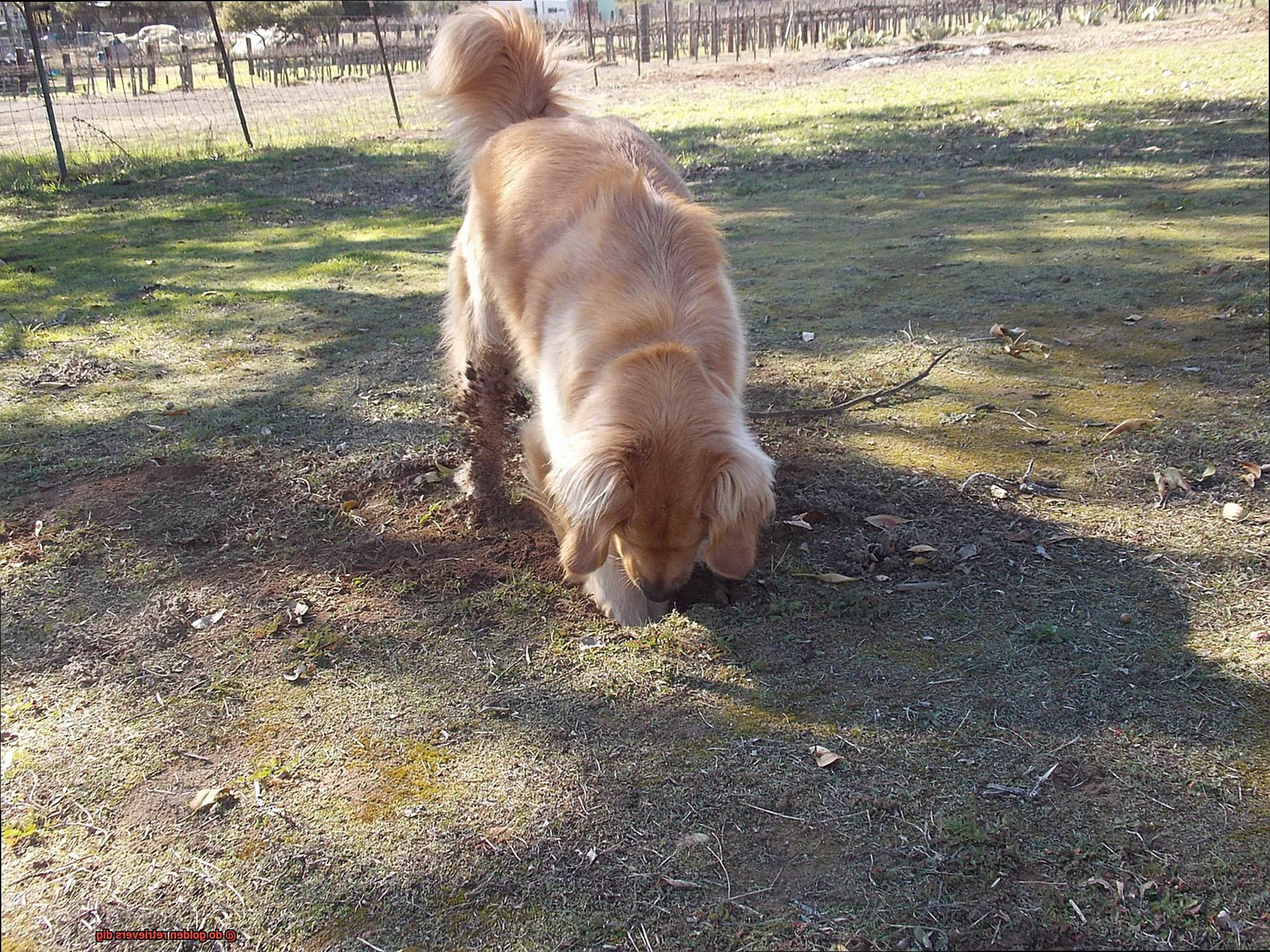
Reasons Why Golden Retrievers May Dig
Golden Retrievers are beloved family pets known for their affectionate and playful nature. However, they also have a tendency to dig, which can be frustrating for owners. If you’re wondering why your Golden Retriever is digging up your yard or garden, there are several reasons why this behavior may occur.
Hunting Instincts
Golden Retrievers were originally bred as hunting dogs, and digging was a natural part of their job. Even though most Golden Retrievers today are not used for hunting, this instinctual behavior remains, and some may still have a strong desire to dig. To address this behavior, provide alternative activities that satisfy their hunting instincts such as playing fetch or hide-and-seek.
Boredom or Lack of Exercise
These dogs are active and energetic, and if they do not receive enough physical and mental stimulation, they may turn to digging as a way to release their pent-up energy. Regular exercise, playtime, and interactive toys can help reduce the incidence of digging.
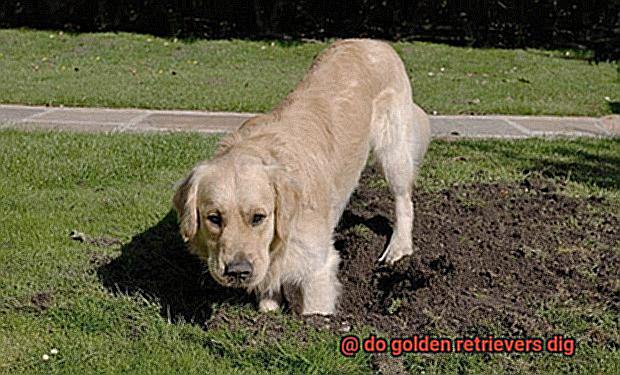
Temperature Regulation
Golden Retrievers may also dig as a way to find cooler ground and regulate their body temperature in hot weather. If your dog is digging for this reason, ensure they have plenty of shade and water available. Additionally, providing a designated digging area where they won’t cause damage can redirect their behavior.
Anxiety or Stress
If your Golden Retriever is exhibiting excessive digging behaviors, they may be experiencing anxiety or stress. This can be caused by separation anxiety, fear of loud noises or other stimuli, or changes in their environment or routine. Addressing the underlying cause of anxiety through training, socialization, and proper care can help reduce this behavior.
Breed Characteristics
Lastly, it’s important to remember that digging may simply be a natural characteristic of the breed. Some Golden Retrievers may have an inherent desire to dig regardless of their circumstances. In these cases, providing a designated digging area or redirecting the behavior to a more appropriate activity can help manage the behavior.
Addressing Unwanted Digging Behavior in Golden Retrievers
However, understanding why your Golden Retriever is digging is essential to addressing the behavior effectively.
Digging is a natural instinct for dogs, and Golden Retrievers are no exception. However, when the behavior becomes excessive or destructive, it’s time to take action. There could be various reasons why a Golden Retriever might start digging, such as boredom, anxiety, lack of exercise, or even a desire to escape from their surroundings.
To tackle unwanted digging behavior in Golden Retrievers, start by providing them with ample playtime and exercise. Engaging them in activities like fetch, tug-of-war, or long walks will keep them active and prevent boredom.
Another effective approach is creating a designated digging area. Marking out a specific area in your backyard where your Golden Retriever is allowed to dig without any restrictions can help curb destructive behavior. Fencing or other boundaries can help your dog understand where they’re allowed to dig freely.
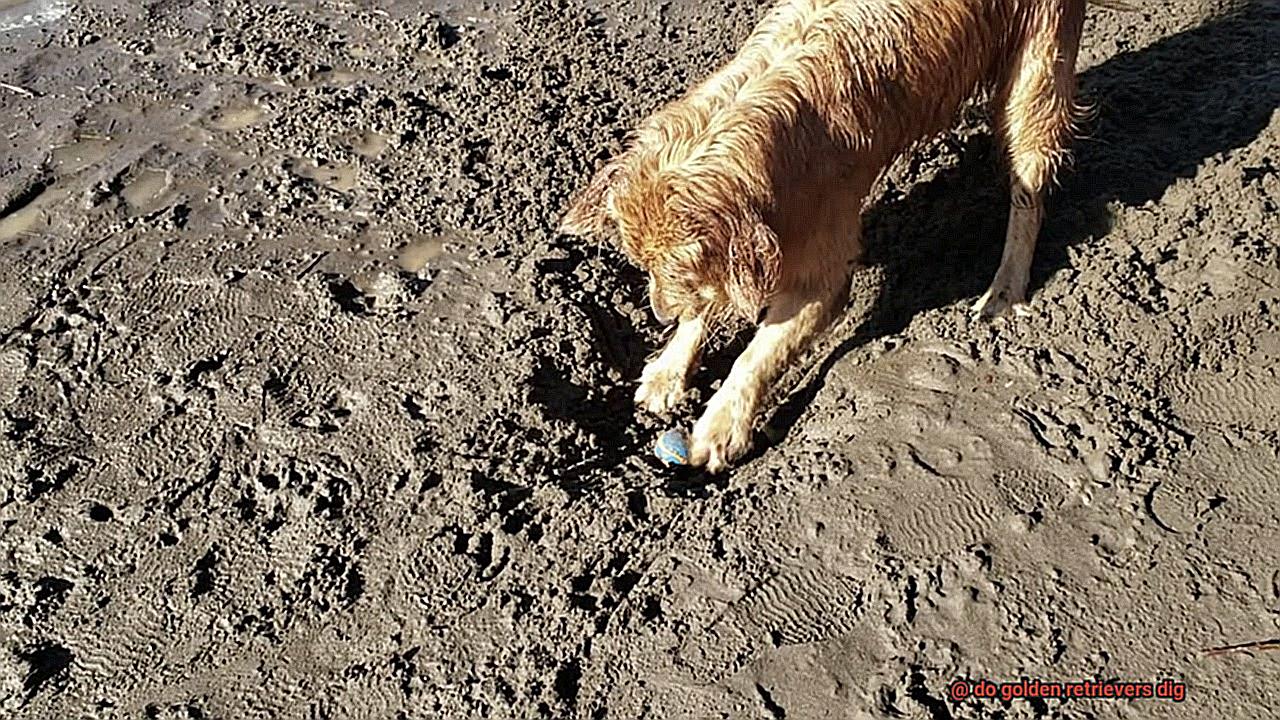
Positive reinforcement training has also been proven successful in addressing unwanted digging behavior in Golden Retrievers. Rewarding your dog with treats or praise when they refrain from digging reinforces positive behavior and discourages negative behavior.
Finally, it’s crucial to supervise your Golden Retriever and redirect their attention if you catch them digging in an area they’re not supposed to. Guiding them towards a designated digging area or engaging them in a different activity can help redirect their energy.
Providing Activities and Toys to Keep Your Golden Retriever Entertained
Golden Retrievers are known for their active and energetic nature, but this can sometimes result in destructive digging behavior. Fortunately, there are many options available to keep your furry friend entertained and mentally stimulated, reducing the likelihood of them digging and improving their overall well-being.
Toys are an excellent way to keep your Golden Retriever occupied. Puzzle toys, in particular, are very effective as they require the dog to use their problem-solving skills to get a treat or toy out of the puzzle. These toys will engage your dog for a longer period of time, providing entertainment and mental stimulation.
Interactive toys such as balls and frisbees are also great options. Playing fetch with your Golden Retriever using these toys provides both exercise and strengthens the bond between you and your furry friend. It’s an excellent way to keep them physically active while also improving their agility and coordination skills.
Along with toys, there are various activities that you can do with your Golden Retriever. Walking or running with them is a fantastic way to provide physical exercise and mental stimulation. Taking them to a dog park where they can socialize and interact with other dogs is also highly recommended.
Training is another activity that can be beneficial for Golden Retrievers. Teaching them new commands and tricks keeps their minds engaged and helps reduce destructive behaviors such as digging. Positive reinforcement training works especially well for Golden Retrievers as they respond positively to praise and rewards.
Creating a Safe and Secure Environment for Your Dog
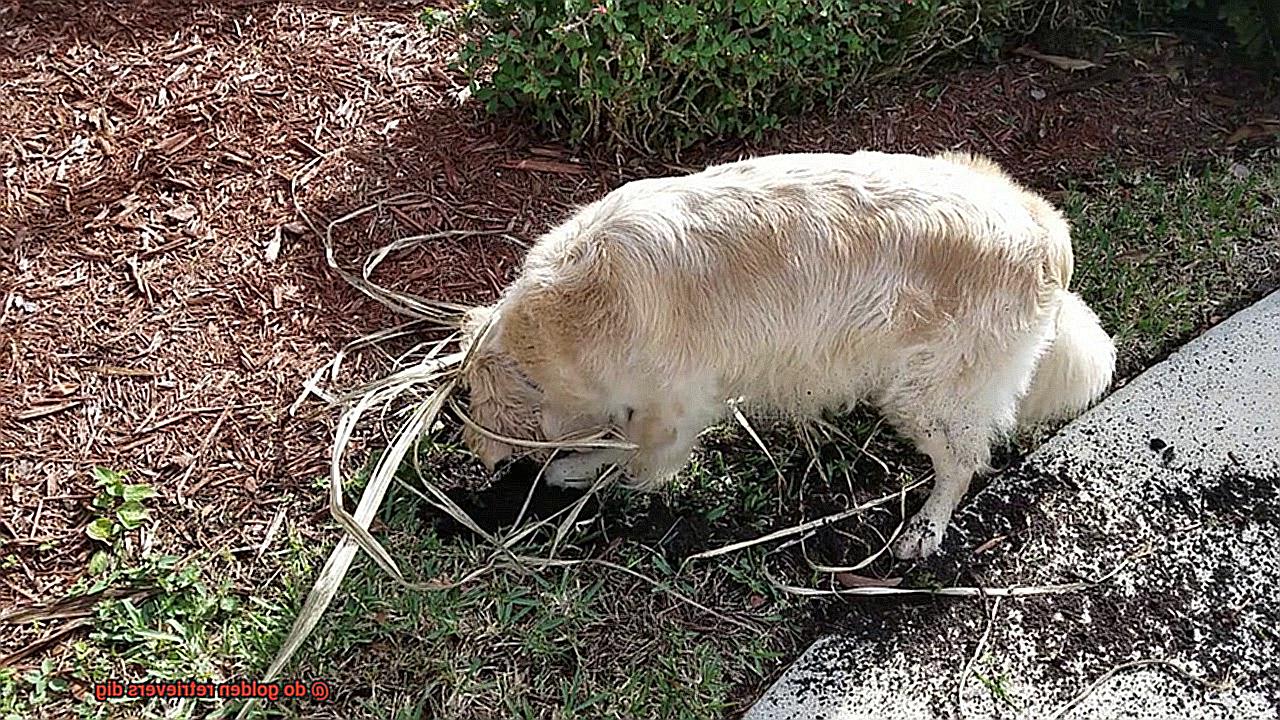
Golden Retrievers are known for their friendly and loyal personalities and make wonderful companions. However, they come with some quirks, such as their innate love for digging. While it may seem like an innocent behavior, it can actually pose serious risks to your dog’s health and safety.
To keep your Golden Retriever safe and happy, you need to understand why they dig in the first place. Often, it’s out of boredom, anxiety, or instinctive behavior. To reduce their need to dig, provide them with plenty of exercise, mental stimulation, and socialization. This will keep them occupied and engaged, reducing the urge to dig.
Another effective way to prevent digging is by creating a designated digging area for your dog. A sandbox or specific spot in the yard can give them the freedom to dig while protecting your garden and preventing your dog from escaping. Redirecting their digging behavior to a specific spot can also encourage healthy habits.
It’s also crucial to secure your yard with proper fencing and gates. Golden Retrievers are natural explorers and can easily wander off if given the opportunity. Ensuring that your yard is properly enclosed can prevent your dog from getting lost or injured while digging or exploring.
Lastly, always supervise your Golden Retriever while they are outside. This will help prevent them from digging in areas where they shouldn’t be or getting into other potentially dangerous situations. By being aware of their behavior and surroundings, you can create a safe and secure environment for them to play and explore in.
Training Techniques to Discourage Unwanted Digging
Fear not, as there are several training techniques available to discourage unwanted digging in your furry friend. In this blog post, we’ll explore some effective techniques that can help you maintain a beautiful lawn and garden while keeping your golden retriever happy and healthy.
The first step in preventing unwanted digging is identifying the reason behind it. Common causes include boredom, lack of exercise, or a desire for attention. Once you know why your furry friend is digging, you can begin addressing the root cause. Providing plenty of exercise and mental stimulation is one of the most effective ways to discourage unwanted digging. This includes taking them for long walks or runs, playing fetch with them, or even enrolling them in obedience or agility classes. By keeping them engaged, your furry friend will have less time to get bored and start digging.
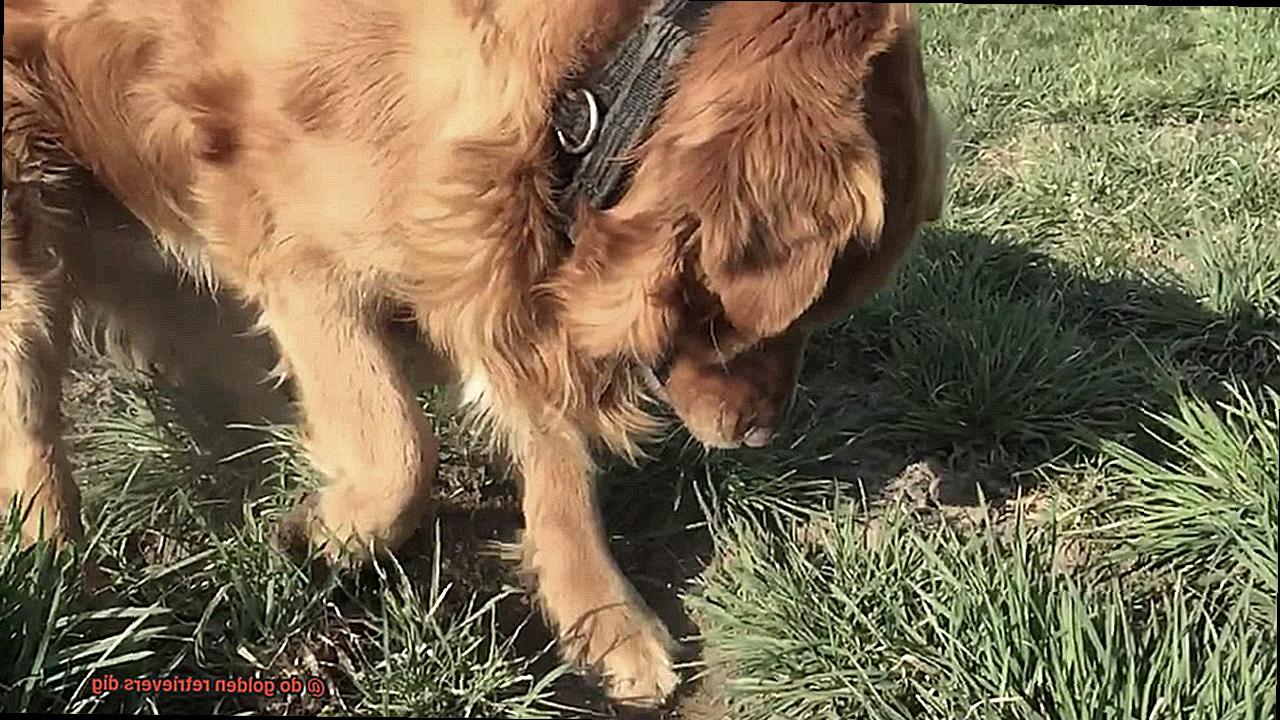
Another technique is to create designated digging areas in your yard. You can use sandboxes or designate a specific spot where your golden retriever can dig without damaging your lawn or garden. Encourage them to use this area by burying toys or treats in it. When they use the designated area, praise them with affectionate words or give them treats as rewards.
If you catch your furry friend digging in an area they shouldn’t be, interrupt their behavior by making a loud noise like clapping your hands or saying “no.” Then redirect their attention to an appropriate activity like playing fetch or going for a walk. Never punish them harshly as it may cause stress and anxiety.
Positive reinforcement is crucial when it comes to training dogs. Make sure to praise and reward your golden retriever when they exhibit good behavior. When they refrain from digging or use the designated digging area, give them treats or praise them with affectionate words. This will encourage them to continue exhibiting good behavior.
Conclusion
In summary, golden retrievers are known for their digging tendencies, which stem from their innate hunting instincts and need for physical and mental stimulation. Whether it’s out of boredom or anxiety, digging is a natural characteristic of the breed that should be understood and managed appropriately.
To prevent unwanted digging, it’s crucial to provide your furry friend with plenty of exercise, mental stimulation, and socialization. You can also create a designated digging area and utilize positive reinforcement training techniques to redirect their behavior towards healthy habits.
While seeing your lawn or garden getting dug up may be frustrating at times, it’s important to remember that dogs have a natural instinct to dig. With proper guidance and management, you can channel your golden retriever’s energy towards positive activities while keeping them happy and safe.









